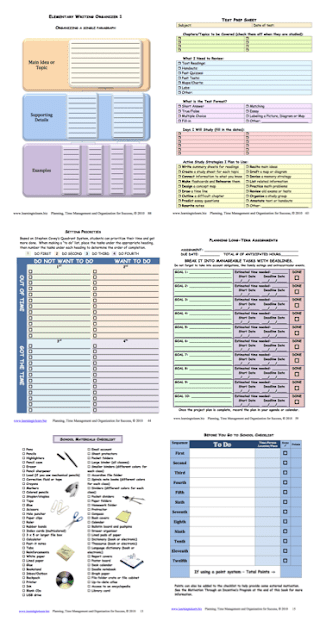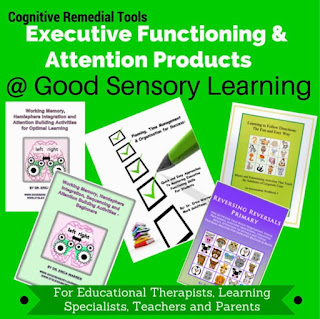This week I wanted to tell you about my online store, Good Sensory Learning. I’m Dr. Erica Warren, and I established this site so I could share all the materials that I have created over the last 20+ years as a learning specialist and educational therapist. When I first began my private practice, Learning to Learn, I had great difficulty finding fun and multisensory materials for my students that were effective and engaging. So back in 2005, I made it my mission to design and distribute high-end, remedial products as well as memorable, motivating lessons that bring delight to learning. If you would like to try a free sampling of my activities , CLICK HERE . How Are the Products Organized at Good Sensory Learning? You can download my Free Printable Catalog or you can browse the site using the grey “search all products” bar in the top right of any page with keywords such as dyslexia, working memory, and executive functioning. What’s more, drop down menus in the red banner allow you t...
Many teachers can not fathom how apparently simple tasks such as using an agenda or turning in an assignment can be very difficult for some of their students. In fact, many students need comprehensive instruction and scaffolding to learn to plan, manage time, and organize. Executive functioning, which encompasses these skills is the last part of the brain to fully develop, and in actuality, does not reach maturation until students reach their early 20's.
How Hard Can it Really Be to Plan, Manage Time and Organize?
How Hard Can it Really Be to Plan, Manage Time and Organize?
 I have to admit, when I first started working with students that struggled with executive functioning, I was surprised how challenging planning, time management, and organization could be for some of my young, bright learners. What seemed to be clear and obvious was obscure, taxing and problematic for them.
I have to admit, when I first started working with students that struggled with executive functioning, I was surprised how challenging planning, time management, and organization could be for some of my young, bright learners. What seemed to be clear and obvious was obscure, taxing and problematic for them.
Instead of compassion and strategies, students that have difficulties with executive functioning are often intimidated, harassed and mishandled with discipline and inconsistent methods that result in poor grades. Many of these students are continually told that they are lazy, unmotivated and careless, and this often results in feelings of frustration, anger, and even helplessness. Acquiring accommodations for students that struggle with executive functioning difficulties is rare, and now, with technology at our fingertips, each teacher seems to have their own way of communicating and collecting assignments. As a result, this population of learners seems to be under additional pressure due to the lack of a cohesive structure across classes and their need for consistency.
They often:
1. lose materials.
2. forget to turn in assignments.
3. leave things to the last minute.
4. miscalculate or underestimate the amount of time it will take to complete a task.
5. fail to record homework in an agenda or planner.
6. leave needed materials at school.
7. leave needed materials at home.
8. fail to prepare for tests.
9. fail to plan and break down long-term assignments into manageable tasks or goals.
10. neglect to plan for midterms or finals.
11. forget details.
12. lose focus and miss important notes or directions.
13. lose mental stamina and fail to complete a task.
14. misplace important materials.
15. rush through work.
So What can be Done to Assist these Students?
1. lose materials.
2. forget to turn in assignments.
3. leave things to the last minute.
4. miscalculate or underestimate the amount of time it will take to complete a task.
5. fail to record homework in an agenda or planner.
6. leave needed materials at school.
7. leave needed materials at home.
8. fail to prepare for tests.
9. fail to plan and break down long-term assignments into manageable tasks or goals.
10. neglect to plan for midterms or finals.
11. forget details.
12. lose focus and miss important notes or directions.
13. lose mental stamina and fail to complete a task.
14. misplace important materials.
15. rush through work.
1. Create a structured daily routine.
2. Set priorities.
3. Generate a homework plan.
4. Break large assignments into manageable chunks.
5. Make to-do checklists.
6. Teach study skills.
7. Illustrate note-taking skills.
8. Demonstrate time management skills by breaking large assignments into manageable chunks with numerous deadlines.
9. Teach test-taking strategies.
10. Demonstrate memory strategies.
11. Help student motivation by offering incentives and positive reinforcement.
12. Create and use graphic organizers for writing.
13. Teach metacognitive skills by thinking through the process aloud.
Where Can I Get Ready Made Materials?
 To learn all about these strategies and more, I have created a 116 page publication on CD or digital download that offers methods and materials that help to structure guide, and support students in the areas of time management, planning, and organization (executive functioning skills). This comprehensive document includes agendas, questionnaires, checklists, as well as graphic organizers for writing and test preparation. You will also find advice and materials in the areas of reading, math, memory, motivation, setting priorities and creating incentives programs. These materials were all created over a ten year period in my private practice. What’s more, the materials are varied and accommodate learners of all ages from elementary to college. Finally, you can also get a free sample assessment from the publication, as well as view a free video on executive functioning. Click Here
To learn all about these strategies and more, I have created a 116 page publication on CD or digital download that offers methods and materials that help to structure guide, and support students in the areas of time management, planning, and organization (executive functioning skills). This comprehensive document includes agendas, questionnaires, checklists, as well as graphic organizers for writing and test preparation. You will also find advice and materials in the areas of reading, math, memory, motivation, setting priorities and creating incentives programs. These materials were all created over a ten year period in my private practice. What’s more, the materials are varied and accommodate learners of all ages from elementary to college. Finally, you can also get a free sample assessment from the publication, as well as view a free video on executive functioning. Click Here
Cheers, Dr. Erica Warren
Dr. Erica Warren is the author, illustrator, and publisher of multisensory educational materials at Good Sensory Learning and Dyslexia Materials. She is also the director of Learning to Learn and Go Dyslexia, in Ossining, NY. To learn more about her products and services, you can go to https://godyslexia.com/, www.goodsensorylearning.com, www.dyslexiamaterials.com & www.learningtolearn.biz
· Blog: https://learningspecialistmaterials.blogspot.com/
· YouTube Channel: https://www.youtube.com/user/warrenerica1
· Podcast: https://godyslexia.com/
· Store: http://www.Goodsensorylearning.com/ & www.dyslexiamaterials.com
· Courses: http://www.learningspecialistcourses.com/
· Newsletter Sign-up: https://app.convertkit.com/landing_pages/69400
2. Set priorities.
3. Generate a homework plan.
4. Break large assignments into manageable chunks.
5. Make to-do checklists.
6. Teach study skills.
7. Illustrate note-taking skills.
8. Demonstrate time management skills by breaking large assignments into manageable chunks with numerous deadlines.
9. Teach test-taking strategies.
10. Demonstrate memory strategies.
11. Help student motivation by offering incentives and positive reinforcement.
12. Create and use graphic organizers for writing.
13. Teach metacognitive skills by thinking through the process aloud.
 To learn all about these strategies and more, I have created a 116 page publication on CD or digital download that offers methods and materials that help to structure guide, and support students in the areas of time management, planning, and organization (executive functioning skills). This comprehensive document includes agendas, questionnaires, checklists, as well as graphic organizers for writing and test preparation. You will also find advice and materials in the areas of reading, math, memory, motivation, setting priorities and creating incentives programs. These materials were all created over a ten year period in my private practice. What’s more, the materials are varied and accommodate learners of all ages from elementary to college. Finally, you can also get a free sample assessment from the publication, as well as view a free video on executive functioning. Click Here
To learn all about these strategies and more, I have created a 116 page publication on CD or digital download that offers methods and materials that help to structure guide, and support students in the areas of time management, planning, and organization (executive functioning skills). This comprehensive document includes agendas, questionnaires, checklists, as well as graphic organizers for writing and test preparation. You will also find advice and materials in the areas of reading, math, memory, motivation, setting priorities and creating incentives programs. These materials were all created over a ten year period in my private practice. What’s more, the materials are varied and accommodate learners of all ages from elementary to college. Finally, you can also get a free sample assessment from the publication, as well as view a free video on executive functioning. Click Here Cheers, Dr. Erica Warren
· Blog: https://learningspecialistmaterials.blogspot.com/
· YouTube Channel: https://www.youtube.com/user/warrenerica1
· Podcast: https://godyslexia.com/
· Store: http://www.Goodsensorylearning.com/ & www.dyslexiamaterials.com
· Courses: http://www.learningspecialistcourses.com/
· Newsletter Sign-up: https://app.convertkit.com/landing_pages/69400


This comment has been removed by a blog administrator.
ReplyDelete